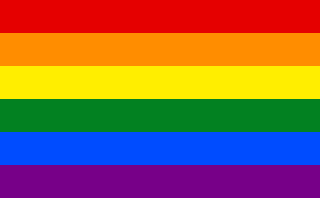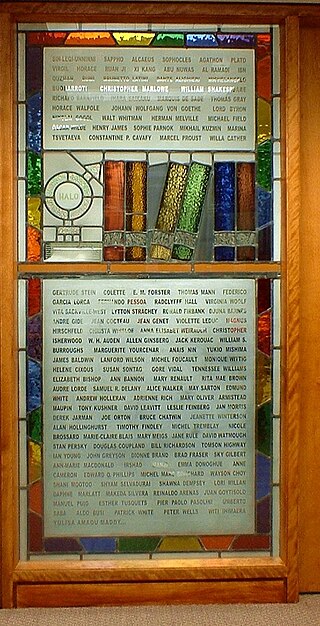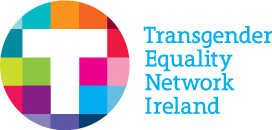
LGBT is an initialism that stands for "lesbian, gay, bisexual, and transgender". It may refer to anyone who is non-heterosexual, non-heteroromantic, or non-cisgender, instead of exclusively to people who are lesbian, gay, bisexual, or transgender. A variant, LGBTQ, adds the letter Q for those who identify as queer or are questioning their sexual or gender identity. Another variation, LGBTQ+, adds a plus sign "represents those who are part of the community, but for whom LGBTQ does not accurately capture or reflect their identity". Many further variations of the acronym exist, such as LGBT+, LGBTQIA+, and 2SLGBTQ+. The LGBT label is not universally agreed to by everyone that it is generally intended to include. The variations GLBT and GLBTQ rearrange the letters in the acronym. In use since the late 1980s, the initialism, as well as some of its common variants, functions as an umbrella term for marginalized sexualities and gender identities.

The LGBT community is a loosely defined grouping of lesbian, gay, bisexual, and transgender individuals united by a common culture and social movements. These communities generally celebrate pride, diversity, individuality, and sexuality. LGBT activists and sociologists see LGBT community-building as a counterweight to heterosexism, homophobia, biphobia, transphobia, sexualism, and conformist pressures that exist in the larger society. The term pride or sometimes gay pride expresses the LGBT community's identity and collective strength; pride parades provide both a prime example of the use and a demonstration of the general meaning of the term. The LGBT community is diverse in political affiliation. Not all people who are lesbian, gay, bisexual, or transgender consider themselves part of the LGBT community.

LGBT culture is a culture shared by lesbian, gay, bisexual, transgender, and queer individuals. It is sometimes referred to as queer culture, while the term gay culture may be used to mean either "LGBT culture" or homosexual culture specifically.
Lesbian, gay, bisexual, transgender, and queer (LGBTQ) personnel are able to serve in the armed forces of some countries around the world: the vast majority of industrialized, Western countries including some South American countries such as Argentina and Chile in addition to South Africa, and Israel. The rights concerning intersex people are more vague.
A sexual minority is a demographic whose sexual identity, orientation or practices differ from the majority of the surrounding society. Primarily used to refer to lesbian, gay, bisexual, or non-heterosexual individuals, it can also refer to transgender, non-binary or intersex individuals.
Families and Friends of Lesbians and Gays (FFLAG) is a voluntary organisation and registered charity in the United Kingdom which offers support to parents and their lesbian/gay/bisexual and transgender children. They have a national telephone helpline as well as several parent support groups and are a support group recognised by the UK Government. FFLAG also works outside the UK with other LGBT family support organisations particularly in Europe.
Supporting Our Youth (SOY) is an organization based in Toronto, Ontario, Canada, which runs programs and events geared to supporting the special needs of gay, lesbian, bisexual, transgender, transsexual and intersex youth. SOY gets support and involvement from local youth and adults that volunteer their time to help improve each other’s lives. SOY’s main focus points are helping the youth create healthy arts, recreational spaces, culture, supportive housing, and employment.

The questioning of one's sexual orientation, sexual identity, gender, or all three is a process of exploration by people who may be unsure, still exploring, or concerned about applying a social label to themselves for various reasons. The letter "Q" is sometimes added to the end of the acronym LGBT ; the "Q" can refer to either queer or questioning.

Many retirement issues for lesbian, gay, bisexual, transgender (LGBT) and intersex people are unique from their non-LGBTI counterparts and these populations often have to take extra steps addressing their employment, health, legal and housing concerns to ensure their needs are met. Throughout the United States, "2 million people age 50 and older identify as LGBT, and that number is expected to double by 2030", estimated in a study done by the Institute for Multigenerational Health at the University of Washington. In 1969, the Stonewall Riots marked the start of the modern gay rights movement and increasingly LGBTQ+ people have become more visible and accepted into mainstream cultures. LGBTQ+ elders and retirees are still considered a newer phenomenon creating challenges and opportunities as a range of aging issues are becoming more understood as those who live open lives redefine commonly held beliefs and as retirees newly come out of the closet.
Various issues in medicine relate to lesbian, gay, bisexual, and transgender people. According to the US Gay and Lesbian Medical Association (GLMA), besides HIV/AIDS, issues related to LGBT health include breast and cervical cancer, hepatitis, mental health, substance use disorders, alcohol use, tobacco use, depression, access to care for transgender persons, issues surrounding marriage and family recognition, conversion therapy, refusal clause legislation, and laws that are intended to "immunize health care professionals from liability for discriminating against persons of whom they disapprove."
Research has found that attempted suicide rates and suicidal ideation among lesbian, gay, bisexual, and transgender (LGBT) youth are significantly higher than among the general population.
Services and Advocacy for Gay, Lesbian, Bisexual, and Transgender Elders (SAGE) is America's oldest and largest non-profit organization dedicated to improving the lives of lesbian, gay, bisexual, transgender and queer or questioning (LGBTQ+) older people, focusing on the issue of LGBTQ+ aging. According to its mission statement, "SAGE leads in addressing issues related to lesbian, gay, bisexual, transgender, queer and questioning aging. In partnership with its constituents and allies, SAGE works to achieve a high quality of life for LGBTQ+ older people, supports and advocates for their rights, fosters a greater understanding of aging in all communities, and promotes positive images of LGBTQ+ life in later years." SAGE is a 501(c)(3) organization that focuses on advocacy on the local and federal levels, as well as activities, groups, and programs that encourage LGBTQ+ older people to stay connected with each other and the community.
Transgender inequality is the unequal protection received by transgender people in work, school, and society in general. Transgender people regularly face transphobic harassment. Ultimately, one of the largest reasons that transgender people face inequality is due to a lack of public understanding of transgender people.

In the post-Stonewall era, the role of libraries in providing information and services to LGBTQ individuals has been a topic of discussion among library professionals. Libraries can often play an important role for LGBTQ individuals looking to find information about coming out, health, and family topics, as well as leisure reading. In the past 50 years, advocate organizations for LGBTQ content in libraries have emerged, and numerous theorists have discussed various aspects of LGBTQ library service including privacy concerns, programming, collection development considerations and librarian/staff education needs, as well as special services for juvenile and teen patrons.

The following outline offers an overview and guide to LGBT topics.

Transgender Equality Network of Ireland (TENI) is an Irish nonprofit organisation founded in 2006, which seeks to improve conditions and rights for transgender people and their families in Ireland.

LGBT Foundation is a national charity based in Manchester with a wide portfolio of services. With a history dating back to 1975, it campaigns for a fair and equal society where all lesbian, gay, bisexual and trans (LGBT) people are able to reach their full potential. They support over 40,000 people directly every year, and a further 600,000 online. They provide direct services and resources to more LGBT people than any other charity of its kind in the UK.
LGBT psychology is a field of psychology of surrounding the lives of LGBTQ+ individuals, in the particular the diverse range of psychological perspectives and experiences of these individuals. It covers different aspects such as identity development including the coming out process, parenting and family practices and support for LGBTQ+ individuals, as well as issues of prejudice and discrimination involving the LGBT community.
The LGB Alliance is a British nonprofit advocacy group founded in 2019, in opposition to the policies of LGBT rights charity Stonewall on transgender issues. Its founders are Bev Jackson, Kate Harris, Allison Bailey, Malcolm Clark and Ann Sinnott. The organisation has said that lesbians are facing "extinction" because of the "disproportionate" focus on transgender identities in schools.







